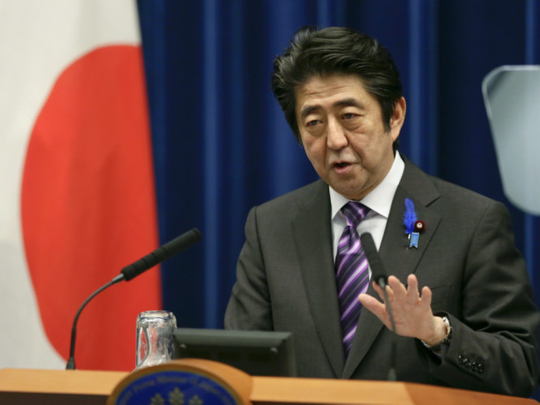
Japan’s cabinet this week tore up what remains of the country’s war-renouncing constitution by declaring Tokyo’s right to defend its allies. Japan will thus join the ranks of other, presumably war-rejoicing, nations who maintain the same right, including known rabble-rousers such as New Zealand and Sweden.
In fact, almost all nations retain the right to what is technically known as collective self-defence. Germany, like Japan on the wrong side of the Second World War, has actually been obliged to defend its allies since the West joined Nato in 1955. Only the likes of Costa Rica, whose constitution abolished the army, hold on unflinchingly to pacifist principles.
Of leading nations, then, Japan has been an aberration. We may lament the fact that yet another country has declared itself ready, if necessary, to wage war. We may abhor the nationalistic rhetoric of Prime Minister Shinzo Abe. However, we should recognise that all the country has done is inch a fraction closer towards becoming a “normal” state.
Modern fighting force
Since 1947, when members of the US occupation drafted Japan’s constitution, Tokyo has forsworn the right to war. Article Nine, the so-called “pacifist clause”, says: “The Japanese people forever renounce war as a sovereign right.” To achieve that, it says: “Land, sea and air forces, as well as other war potential, will never be maintained.” Japanese soldiers, it is true, have not fired a shot at an enemy in nearly 70 years. Yet the idea that Japan has no army, navy or air force does not bear scrutiny. Its “self-defence forces” are a modern fighting machine in all but name.
The US has tried to persuade Japan to ditch pacifism almost from the moment the constitution was enacted. After war broke out on the Korean peninsula, the US decided it did not want a toothless ally. Tokyo, though, found the pacifist constitution convenient. Outsourcing defence to Washington allowed it to concentrate on becoming rich.
That position has more or less held. Until recently, tanks were required to stop at traffic lights. A decade ago, however, Junichiro Koizumi, then prime minister, began to nudge the definition of “pacifism”. He provided logistical support for the war in Afghanistan. He sent a small military contingent to Iraq, though it was (unhelpfully) not allowed to fight. Koizumi also raised the issue of collective self-defence, pointing out that technically Japan would be unable to help the US even if one of its aircraft carriers came under attack off the Japanese coast.
Abe has pushed things further. Under him, Japan has formed a national security council, enacted a secrecy bill and weakened limits on arms exports. Kenneth Pyle, an academic who predicted a radical overhaul of Tokyo’s defence policy in his 2008 book Japan Rising, says the prime minister has overseen a “sea change” made easier by China’s growing power and assertiveness.
Several questions arise. First, should we be wary of Japan adopting a more normal defence posture? After all, Germany has participated in conflicts such as Afghanistan. It even has conscription. To say Japan should be denied a right granted to others must imply that it is uniquely untrustworthy or unrepentant. That is certainly the view held by many in China and Korea. Though Tokyo has apologised on numerous occasions, the sincerity of those apologies is disputed. Yet Japan should also be judged by its post-war record. True, its pacifism has nestled under the protection of the US nuclear umbrella. But Tokyo has not been directly involved in a single conflict since 1945.
Second, has Abe been devious? Donald Keene, a renowned scholar, calls Article Nine “the glory of Japan”. By reinterpreting rather than amending it, Abe has skirted the need for a referendum, something he would almost certainly lose. “People feel deep anxieties about where Abe is frogmarching the nation,” says Jeff Kingston at Temple University, Tokyo. Pacifism has become a “touchstone” of Japan’s national identity, he says.
Certainly, there has been a lack of public debate over such a big change. It is worrying that almost no Japanese media deemed it newsworthy that a man set himself alight in protest at the constitutional reinterpretation. When China’s media is similarly selective, we call it state censorship.
Third is the question of what Abe intends to do with his newly won freedom, assuming it is ratified by parliament. Related is how neighbours, particularly China, will react. Some Japanese are convinced Japan will now be dragged into the next US military adventure.
In Washington the concern is increasingly the reverse: that the US could be pulled into conflict over Japan’s territorial dispute with China in the East China Sea.
Abe appears to suggest Japan could help smaller countries, such as the Philippines, protect their territorial interests against China. That may be comforting to Manila and Hanoi but could be incendiary to Beijing. It is hard to deny Japan’s right to a more normal defence posture. That does not mean we have to celebrate it.









